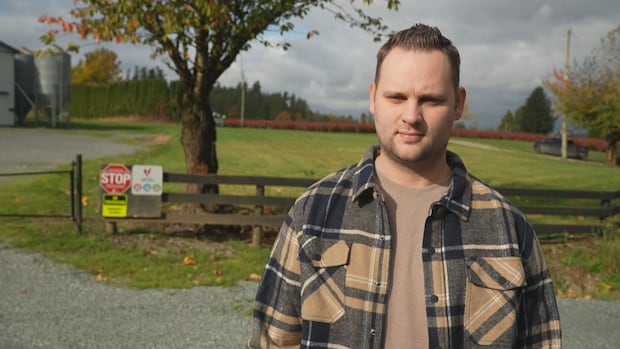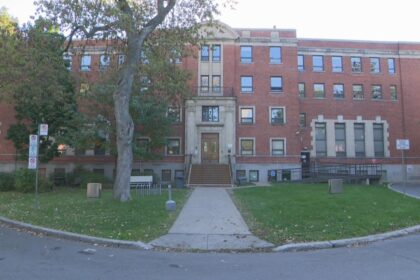British ColumbiaAs avian flu season ramps up, with at least 13 commercial poultry farms in B.C.’s Fraser Valley infected so far, local farmers are testing new technologies to stop the spread of the highly contagious disease.Around 75 farms are part of a program funded by the province to test air filtration and other techLauren Vanderdeen · CBC News · Posted: Nov 04, 2025 12:53 PM EST | Last Updated: 2 hours agoListen to this articleEstimated 4 minutesFraser Valley chicken farmer Matthew Burgsma is part of a new research group testing new technologies to prevent avian flu from spreading. (Kier Junos/CBC)As avian flu season ramps up, with at least 13 commercial poultry farms in B.C.’s Fraser Valley infected so far, local farmers are testing new technologies to stop the spread of the highly contagious disease.The tests are part of a working group that started earlier this year, supported by the province’s $2.5-million Novel Tools and Technologies Program.Fraser Valley chicken farmer Matthew Burgsma has installed heat exchangers with MERV 16 filtration, a type of air filter often used in hospitals to remove harmful bio-aerosols, as part of the program.“What we’re doing is we’re pulling all … the fresh air in through those filters to ensure that the birds have a safe environment, that we mitigate any dust or potential particulate matter that could get into the barn that could carry the virus,” Burgsma said.WATCH | New farm tech tested in Fraser Valley to prevent the spread of avian flu:Farmers in B.C.’s Fraser Valley test new technology to stop avian fluAs avian flu cases continue to rise at commercial farms in the Fraser Valley, chicken farmers are scrambling to find ways to protect their animals. As the CBC’s Kier Junos reports, this includes testing out new technology to prevent the spread of the disease.Burgsma noted the new technology adds to the current, stringent bio-security measures already required.While his farm has avoided infection so far, Burgsma said the risk of an avian flu infection — which would mean having to cull the whole flock — weighs heavily on poultry farmers.“It’s a real toll on mental health.… It’s our livelihood.”Burgsma said he’s hopeful the new technologies will help.“I think, as an industry, we can become stronger through these trials, and we’re looking forward to some positive results.”The Ministry of Agriculture and Food will work with farms to test some of the filters for the avian flu virus, according to Burgsma.B.C.’s chief veterinarian Theresa Burns said the program grew naturally from discussions among farmers.“This really started with producers sitting around tables and thinking what else could they do to reduce the risk in their flocks,” Burns said.Dr. Theresa Burns, B.C’s chief veterinarian, says the program came about after discussions with farmers. (Justine Boulin/CBC)Experts from Simon Fraser University have also weighed in, using research on best practices for infection control from farms and hospitals across the world.In addition to filtration systems, farmers can also apply to get funding for various tools, including ultraviolet light systems to disinfect incoming or recirculated air, electrostatic precipitator systems that collect and remove electrostatically charged dust particles from the air, or positive pressure ventilation systems that create a positive air pressure system within barn airspaces where poultry are kept.Farmers in B.C. are testing new methods to prevent avian flu from spreading. (Ben Nelms/CBC)Around 75 poultry farms in the Fraser Valley are upgrading their farms as part of the program.Burns said the provincial funding, which totals about $30,000 per farm, may not cover the full cost of implementing the new tech, but it is an incentive for farmers to try something new. And in exchange, the province gets data about how practical the new tech is.“It’s really a field trial, or a citizen science type program,” Burns said. “But it also provides farmers with tools they can use this year to see if they can further reduce their risk.”The fall season, between October and the beginning of December, is the most high-risk period for avian flu infections in the Fraser Valley, according to Burns, due to the migratory path of birds flying south for the winter.While avian flu is not a food safety issue, according to the Canadian Food Inspection Agency (CFIA), Burns said it can be very difficult for farmers to deal with.She said data collected from the program will be reviewed from February to around June, after the high-risk period ends.WATCH | Avian flu strikes Fraser Valley farms:Avian flu hits 8 Fraser Valley poultry farmsAvian flu has broken out in at least eight locations across B.C.’s Fraser Valley this October, according to the Canadian Food Inspection Agency. Shawn Hall, a spokesperson with the B.C Poultry Association, spoke to The Early Edition about how the industry has evolved to deal with the regular occurrence of the disease.The CFIA told CBC News that 310,000 domestic birds have been ordered culled in the Fraser Valley this fall, up until Oct. 27, due to the detection of highly pathogenic avian influenza. For Burgsma, he said he’s ready to see the results of how effective the new technology is.“I’m happy to do my part and be a part of this team that’s kind of come up with these suggestions,” Burgsma said. “And I’m just really hoping and praying that my farm stays avian influenza free.”ABOUT THE AUTHORLauren Vanderdeen is a web writer for CBC British Columbia. She formerly worked for community newspapers, including the Burnaby Now and New West Record. You can reach her at lauren.vanderdeen@cbc.ca.With files from Kier Junos
Farmers in B.C.’s Fraser Valley test new tech to ward off avian flu











